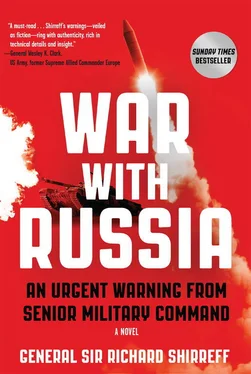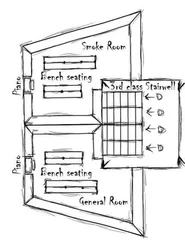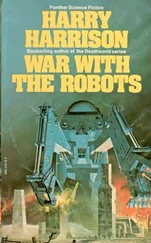In Ukraine, despite the political ambiguity of the 2014 Minsk ceasefire, major fighting has ceased and the war settled down to a semi-frozen conflict, with both sides— Ukrainian Army and “Russian Separatists,” although supported by Russian regular forces— occupying entrenched positions. Behind Ukrainian government lines a form of normality has emerged, which allows US trainers to work with the Ukrainian army under near peacetime conditions.
Unaccountably, the strident Kremlin propaganda of two years ago, portraying the deployment of trainers as evidence of the NATO threat to Russia, has recently gone quiet, helped no doubt by increasingly close cooperation between Russia, America, France, and Britain over air strikes in Syria. This absence of vitriol and threats gives the US president further confidence to send more US equipment and trainers, although still without proper “boots on the ground” protection in case it is deemed “provocative.”
Meanwhile, in Russia, the President’s personal ratings have begun to suffer as a result of the troubled economy and falling ruble, under ever-increasing pressure from continued sanctions and the volatility of the oil price, Russia’s main foreign revenue earner. GDP has fallen by around four percent annually since 2014. Despite this, defense spending has risen, as planned, by forty percent in the last three years. The President’s popularity has never recovered properly from the humiliation in 2015 of a Russian tourist jet being blown to pieces by jihadists over Sinai and a warplane being shot down by the Turkish Air Force, and his failure to take revenge. The President knows he needs to balance the economic books, or do something remarkable, if he is to regain the massive levels of popular support he enjoyed in those heady days after the successful invasion of Crimea in spring 2014.
His solution: to resolve, once and for all, the Ukraine problem and so fulfill the blood-stirring promise he made to the Russian people in his Crimea victory speech in 2014, that Russia and Ukraine are “one nation” and “Kiev is the mother of Russian cities.” The President now needs to engineer the circumstances to allow him to do this.
Thus it is that a potentially dangerous situation has been made very much worse, because the President has been emboldened by the continued disunity and weakness of the West in the three years since he first annexed Crimea and captured parts of Ukraine. In the face of this, rather than being persuaded to abide by international law, the President has decided to attempt further foreign adventures, particularly when his analysts in the FSB— Russia’s external intelligence agency and successor to the KGB—assure him that the promises made in 2014 at the NATO Summit and ratified in Warsaw in 2016, “to strengthen collective defense,” have not been met. They tell him that its decision to deploy four battalions to the Baltic States and eastern Poland, far from building a credible deterrence, NATO is erecting a Potemkin village. [1] 1. “Potemkin village” derives from the deception efforts of Prince Potemkin, statesman and favorite of Catherine the Great, who erected dummy villages along the banks of the Dnieper River in order to fool the Empress into thinking that the area was settled and prosperous during her visit to the Crimea in 1787.
In short, NATO has failed to send the necessary strong signals that it is ready and capable of implementing collective defense and, in time of crisis, manning up to the Article 5 Guarantee that decrees that an attack on one NATO member is an attack on all NATO members; the very cornerstone of the NATO alliance.
The President’s principal military advisor, the Chief of the Russian General Staff, has further assured him that NATO lacks the knowledge, capability, and military hardware necessary to match Russia’s ever-improving conventional capability. The Americans have disbanded their two heavy brigades in Germany, reduced their stationed forces in Europe to a handful, and would be hard pressed to redeploy to Europe quickly enough to respond to a potential Russian ground threat to NATO territory.
The Chief of the General Staff also pointed out that, while the Americans may have forward-based tanks and other military hardware in Eastern Europe and the Baltic States, it will be impossible to man them with trained crews quickly enough to prevent a Russian grab of the Baltic States. The Russians can dispatch an airborne brigade onto Riga from their aviation base at Pskov, only fifty minutes flying time from Riga. They would be in control of the Latvian capital before any Americans managed to even take off from their base at Fort Hood, Texas. Once the Russians were in control it would be game over. It is one thing to deter an attack with a credible force, quite another to mount an invasion from over 5,000 miles away.
Furthermore, in stark contrast to NATO’s aging armory of attack helicopters, tanks, and artillery—much of it dating from the 1980s and 90s—the Russian army now boasts state-of-the-art equipment, exemplified by the new T-14 Armata tank, first unveiled in the Red Square Victory Parade in May 2015.
But the Chief of the General Staff has also assured the President that Russia’s conventional capability is only there to threaten and intimidate. Of equal importance, and far greater subtlety, Russia has continued to refine its asymmetric or, as they call them, maskirovka (deception) tactics, as deployed so effectively in Crimea three years before; undermining the integrity of a target state from within, but keeping such actions under the threshold that might trigger a NATO response.
Despite warnings from the now very worried Baltic States, NATO has failed to even recognize that maskirovka and undercover operations are being actively used against those member states. They are the next obvious targets and it is only too obvious to them what is going on. To most United States and Western European politicians, however, these are annoying distractions on the far borders of Europe; incidents that rarely merit even a mention in their media. Their more immediate concern is to satisfy their electorates and keep themselves in power.
The President and his advisors in the Kremlin have watched and noted this ever-growing western malaise. So the scene is set for the President to complete his strategic intent: to reunite ethnic Russian speakers in the former states of the Soviet Union under the banner of “Mother Russia.”
1730 hours, Tuesday, May 9, 2017
Kharkiv, Ukraine
AFTER THE DARKNESS and bitter cold of the Ukrainian winter, spring is a time of optimism for the people of Kharkiv. And this Victory Day holiday afternoon was no exception. Warm spring sunshine set off the white walls and golden domes of Pokrovsky Cathedral. In Maxim Gorky Park, groups of students from the many universities in the city played football, or lay on the grass chatting, while extended families gathered to picnic and barbecue to celebrate the holiday.
In the city, the cafés and bars in Freedom Square were full of people making the most of the weekend and the weather. It seemed a long time since the 2015 Minsk ceasefire effectively froze the war of 2014–15. Since then, the provinces of Donetsk and Luhansk had become de facto Russian protectorates, now known to their Russian “peace-keepers” as the province of Novorossiya. An uncertain peace prevailed, regularly broken by flare-ups along the front line between the Ukrainian army and Russian-backed separatists.
A lone man made his way through the groups of revelers, scanning the crowd as he walked. Unobtrusive at around medium height and in his early thirties, with close-cropped dark hair and a black, zip-fronted fleece jacket over a newly laundered white T-shirt, he moved with an easy, sinewy stride; a man used to covering ground with minimum physical effort, always keeping something in reserve. However, Anatoly Nikolayevich Vronsky was not enjoying the sun. A driven, utterly focused man, Vronsky accepted nothing but the best, and things looked as if they might be unraveling before they had even started.
Читать дальше












